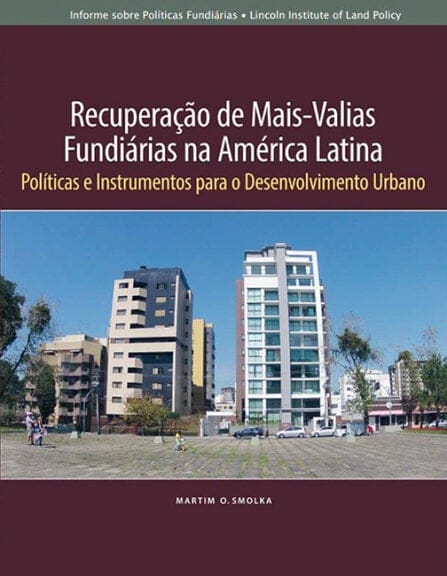Informes sobre Políticas Fundiárias

Recuperação de Mais-Valias Fundiárias na América Latina
Políticas e Instrumentos para o Desenvolvimento Urbano
Setembro 2014, português
Urbanization in Latin America is associated with strong pressure for the supply of serviced land, resulting in significant changes in land values that are distributed unequally among landowners and other stakeholders. Conventional fiscal policies and instruments largely neglect how the costs of providing urban infrastructure and services are socialized, and how their benefits are privatized.
The notion of value capture is to mobilize for the benefit of the community at large some or all the land value increments (unearned income or plusvalías) generated by the actions of others besides the landowner, such as from public investments in infrastructure or administrative changes in land use norms and regulations. Many countries in Latin America, notably Brazil and Colombia, have passed legislation that supports value capture principles, and some jurisdictions have applied this potentially powerful financing mechanism by using a variety of locally adapted tools and instruments.
This discussion of the concept of value capture explains its justification and increasing popularity, provides a brief review of its antecedents in Latin America and elsewhere around the world, and illustrates its many forms and longstanding presence in the urban planning agenda. The reasons for its growing popularity are manifold: regional economic stabilization and fiscal decentralization; more progressive strategies for urban planning and management; re-democratization, increased social awareness, and demands for equitable public policy responses; changing attitudes toward privatization and public-private partnerships; the influence of multilateral agencies; and pragmatic considerations to capture land value increments to raise funds for local community needs.
This report, Recuperação de mais-valias em Fundiárias na América Latina: Políticas e Instrumentos para o Desenvolvimento Urbano (Implementing Value Capture in Latin America: Policies and Tools for Urban Development), examines a variety of specific instruments and applications in municipalities throughout the region under three categories: property taxation and betterment contributions; exactions and other direct negotiations for charges for building rights or the transfer of development rights; and large-scale approaches such as development of public land through privatization or acquisition, land readjustment, and public auctions of bonds for purchasing building rights. It concludes with a summary of lessons learned and recommends steps that can be taken in three spheres:
-
- Learn from Implementation Experiences: While value capture charges in theory are neutral regarding land use and should fall entirely on landowners, in practice successful implementation demands management skills to deal with many complex factors and diverse stakeholders. In addition it requires proper understanding of land market conditions, comprehensive property monitoring systems, a fluid dialogue among fiscal, planning, and judicial entities, and the political resolve of local government leaders.
-
- Increase Knowledge about Theory and Practice: Conducting research, documenting and disseminating implementation experiences, and providing evidence about how value capture policies work on the ground are essential to overcome the disjunction between rhetoric and practice and to change the behavior and attitudes of public officials, landowners, and the community at large.
-
- Promote Greater Public Understanding and Participation: Land value increments are captured more successfully from landowners and other stakeholders who perceive they are receiving greater benefits from a public intervention than those accruing from business as usual. Furthermore, value capture tools are more likely to succeed when used to solve a locally recognized problem.
About the Author
Martim O. Smolka is senior fellow and director of the Program on Latin American and the Caribbean, and co-chairman of the Department of International Studies at the Lincoln Institute of Land Policy.
To obtain a printed copy of this report in Portuguese, contact capacidades@cidades.gov.br.
Keywords
Desenvolvimento, Gestão do Crescimento, Infraestrutura, Lei de Uso do Solo, Monitoramento do Mercado Fundiário, Regulação dos Mercados Fundiários, Planejamento de Uso do Solo, Valor da Terra, Tributação Imobiliária, Governo Local, Finanças Públicas, Políticas Públicas, Regimes Regulatórios, Tributação, Recuperação de Mais-Valias, Tributação de Valores
